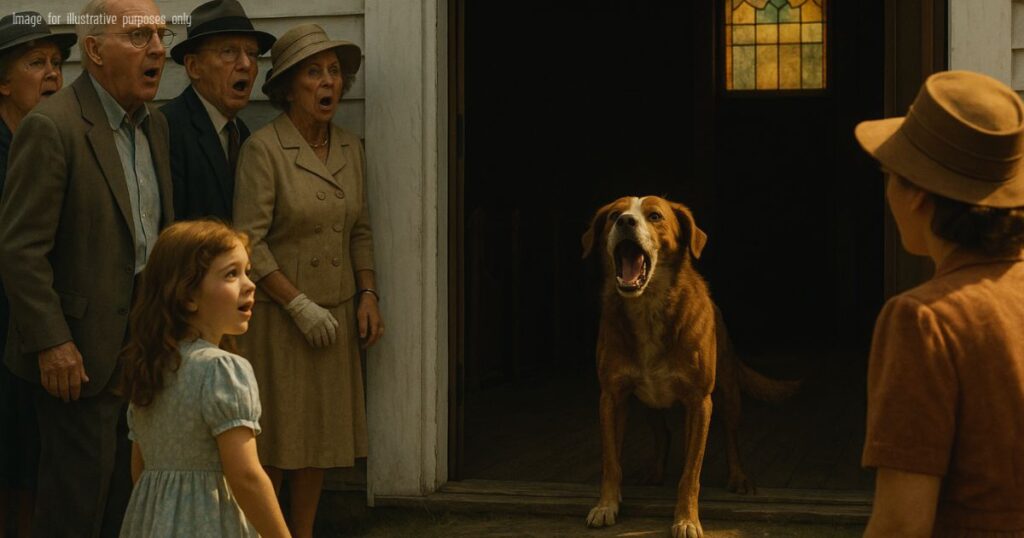Part 6: When Memory Walks Beside You
Early Summer 1978 – McCall, Alabama
The bark faded like a ripple in still water.
Not loud. Not long. Just one clear note.
But it changed the air.
Earl Mathers, who had half a working ear from a farming accident, turned sharply from the vestibule and muttered, “I’ll be—he’s back.”
Mrs. Thelma clutched her chest and sat down fast.
Preacher Myron looked up from his notes and whispered the hymn that followed without opening the book.
Elsie didn’t turn around.
She didn’t need to.
Some sounds don’t come from behind you.
They come from within.
After service, no one moved to leave.
It was as if the sanctuary itself had settled into stillness, like the breath right before a song begins.
Then Elsie stood.
She walked to the last pew.
Knelt.
And brushed her fingers along the cushion like she always did.
But this time, she didn’t stop there.
She reached under the pew—and pulled out something wrapped in newspaper, soft and creased and careful.
It was a collar.
Old, worn leather.
No tag.
Just a round rusted ring and a single thread of white fur clinging to the inside.
“That was Scout’s,” Jewel breathed. “But we buried it with him.”
Earl scratched his beard. “Then how in blazes did it get back here?”
Elsie didn’t answer.
She just looped the collar over her shoulder like a satchel strap and said, “Some things don’t stay buried if they still got something to do.”
The next week, a new family came to the church.
Transplants from Birmingham—quiet, unsure, polite.
Their little boy, Matthew, wouldn’t speak.
Six years old. Wide-eyed. Trembled at the creak of the pews. Wouldn’t look anyone in the eye.
He sat on his mama’s lap for the first hymn, fists clenched.
But during the second, he slid down and walked—slowly, quietly—toward the back pew.
Toward Mercy’s seat.
He stood beside it, turned his head to the side like he was listening, and then, without a word, climbed up and curled into the cushion.
Rested his head exactly where Mercy used to lay his.
Closed his eyes.
Didn’t move.
After service, Matthew tugged on Elsie’s sleeve.
Spoke in a whisper like it was a secret.
“He was there.”
She nodded.
“What’d he say?” she asked.
The boy’s lips trembled.
“‘It’s safe now.’”
That summer, more people came.
And Mercy came too.
Not in body—but in breeze, in bark, in warmth that filled the last pew like steam rising from sunlit wood.
A boy left behind a wooden train.
A widow dropped a handkerchief with her late husband’s initials.
Someone pinned a letter there once—just folded in half, written in shaky script:
“I forgive you.”
No one ever claimed it.
But it stayed on that pew for weeks before the wind took it.
One July morning, Jewel took Elsie out to Clarence’s old toolshed.
They hadn’t opened it since the funeral.
It smelled like dust and motor oil, and the light flickered through the warped slats like a stuttering film reel.
“Your grandpa kept something in here,” Jewel said, pulling down an old crate.
Inside was a photo.
Clarence and Scout.
And pinned to the back, a yellowed note.
“If something ever comes back to this place that don’t make sense—but feels like love—trust it.
I asked for that.”
Elsie placed the note in her Bible, beside Psalm 91.
And every week after, she read it silently before the service.
Then she’d turn and look at the pew.
Not for Mercy.
Not even for Grandpa.
But for whoever needed that space next.
One Sunday in late July, a baby cried through the opening hymn.
People tensed—expecting a fuss, a hasty exit.
But the cry stopped.
Just…stopped.
The mother, flushed and tired, sat down slowly in Mercy’s pew.
The baby yawned. Closed his eyes. Smiled.
And a wind rolled through the sanctuary—sweet and slow, smelling faintly of pine and rain.
Jewel leaned over to Elsie and whispered:
“Mercy always knows when he’s needed.”


